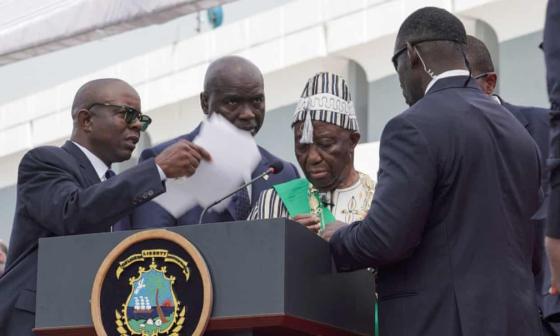Liberia: The Heat Wave that Halted Liberia’s Presidential Inauguration

By Michael Roberts
Liberians and their international guests had gathered on Capitol Hill, the seat of the government, to celebrate a major democratic milestone that, for the second time in succession, saw the peaceful transfer of power from one democratically elected president to another. The environment was adorned in red, white, and blue, along with other fabrics that exuded picturesque African style and beauty. This was the inauguration of 79 years old President Joseph Nyuma Boakai as the 26th President of Africa’s oldest republic, Liberia.
The colorful event soon crash-landed when the newly inaugurated president started showing signs of losing his breath and slurred words.
President Boakai began to lose consciousness in the middle of the delivery of his inaugural address, struggling to breathe before his security guards ran to his rescue.
He was, however, among many other guests in attendance who suffered a similar disconcerting scenario, with one death reported: a senator from Grand Bassa County fainted and he was stretchered out for emergency care; two presidential security guards passed out; one assistant minister also collapsed and another person confined to intensive care unit.
The unfortunate incident brought the event to an abrupt end to the shock of international guests.
Following assessments by medical experts, it was discovered that the President and all the victims suffered heat exhaustion and mild respiratory distress due to high temperature.
Organizers of the national event made no provision for ventilation of the area in spite of the growing wave of heat as a consequence of climate change.
It was reported that the 79-year-old Liberian leader was wearing a thick African fabricated clothing with bulletproof underneath it for protection.
This, according to experts, made matters worse, especially during the scorching sun in spite of the outdoor nature of the program.
The heatwave could have been a result of methane in the atmosphere due to the predisposition of the area to smokes from burned garbage from nearby communities a few hours before the event.
It has become a widespread phenomenon across Monrovia and other populated cities that residents would set trash containing huge amounts of toxic substances ablaze as a way of disposing of them.
Due to the government’s inability to remove stockpiles of garbage from across urban and commercial areas, the citizenry have resorted to burning garbage despite the adverse impacts such habit would have on the environment and their individual lives. This has made air pollution reach a crisis point and the abundance of carbon dioxide in the environment.
According to Global Clean Air, methane, a dangerous pollutant that comes from burning wastes, can result in poor air quality by contributing to the formation of ground level ozone and particulate pollution. Exposure to ozone and particulate pollution damages airways, aggravates lung diseases, causes asthma attacks, increases rates of preterm birth, cardiovascular morbidity and mortality, and heightens stroke risk.
The Indian Air Quality Index (AQI) notes that the rising number of air pollutants has made breathing fresh, clean air next to impossible. The causes of air pollution have left everyone worried about their health. Air pollution being the largest environmental killer, kills over 17 billion people worldwide. While calculating, that’s up to 2.2 years lost on an average.
The Author:
Michael Roberts is a Liberian journalist with keen interest in environmental reporting, climate change, fisheries and investigative reporting. He can be reached via WhatsApp at +231777646368/+231886646368 and email; editor@mnewsafrica.com.
